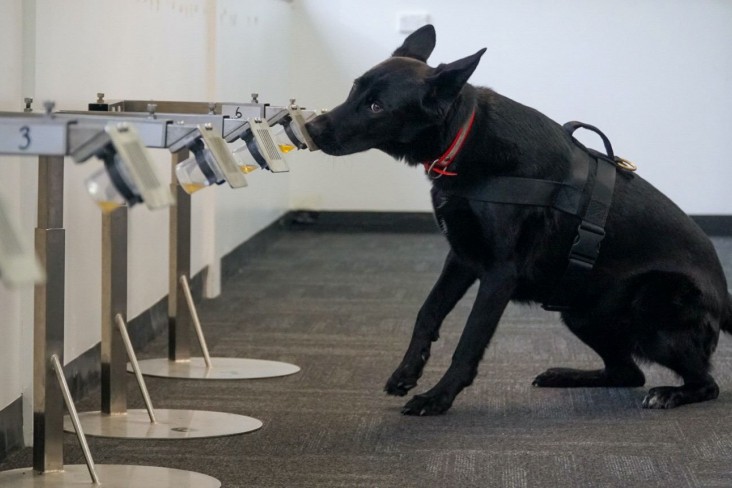With her trusty K9MD handler Erika Proebstel by her side, Weta bounded into the room with excitement - she was on a mission to sniff out cancer trouble.
After carefully sniffing through eight urine samples, Weta stopped dead in her tracks at sample #6. It was collected from a bowel cancer patient and Weta knew she had found something important.
Erika confirmed Weta’s amazing detection skills with an enthusiastic "yes!" and rewarded her furry friend with a game of tug-of-war - Weta’s favourite high-value reward since she started her training as a medical detection dog.
In December 2021, Weta completed a blind randomised control trial as a validation for the proof-of-concept stage. Held over five consecutive days with 300 samples, Weta detected all positive Bowel cancer samples at 100% (sensitivity) and ignored all negative samples that were not cancerous at 100% (specificity).
Weta is one of the dog squad members at K9 Medical Detection (K9MD) New Zealand, a registered Charitable Trust comprised of a dedicated team working to improve the health of all New Zealanders by using specially trained dogs working in a controlled clinical environment to assist in the detection of cancer and other diseases. They have eight dogs including Weta in the organisation, currently sharing their passion of using their keen sense of smell to detect cancers, from colorectal cancer, prostate cancer to ovarian cancer.
Dogs have an incredible sense of smell, capable of detecting stable concentrations as low as 1-2 parts per trillion, which is equivalent to a human smelling a teaspoon of sugar in two Olympic-sized swimming pools of water.
Pauline Blomfield, Founder and CEO of K9MD, told us that the organisation's vision is to create a simple diagnostic urine test as an early, non-invasive, value-add tool in the fight against cancer.
“It is widely acknowledged that early detection greatly enhances the chance of a patient's survival,” Pauline said. “We aim to support the health system by helping to prioritise patients. To enhance existing screening programmes or facilitate screening for a disease that isn’t currently screened for.”
The selection process of dogs for the K9MD programme is rigorous and only the best dogs are eligible. Breed is not a key factor; instead, their working ability and temperament determine their suitability for the programme. Puppies are selected to be raised and socialised to prepare them for their scent detection training that will be around six months before moving on to more comprehensive and high-level training programmes as they grow into adulthood.
The organisation works with experienced dog trainers, university professors, doctors, nurses, and clinical researchers to develop and improve the K9MD programme.
Professor Konrad K. Richter, General Surgeon and Surgical Oncologist at Southland Hospital, says patients get diagnosed worldwide with colorectal cancer at a younger age nowadays, however in New Zealand timely colonoscopies for symptomatic patients or early age screening purposes are not readily available across the country. “A successful sensitive non-invasive test for early detection of colorectal cancer would be a fantastic and game-changing tool for our people. In addition, it would allow surgeons to operate successfully and cure more people.”
Professor Richter further notes that preliminary studies by the K9MD team have shown a very high sensitivity and specificity, above 95%, for detecting colorectal cancer in saline samples using their highly trained dogs. These dogs have now commenced training on patient urine samples, showing a clear positive odour recognition of colorectal cancer. On the other hand, a group of studies have been evaluated for the accuracy of faecal occult blood tests; the pooled sensitivity was 31%, while the pooled specificity was 87%. This indicates that medical detection dogs can play a valuable role in aiding with cancer detection.
“The K9MD research protocol has undergone a thorough and robust ethical approval process, and we can now offer our patients to participate in our exciting research,” Professor Richter says.
The K9MD dogs have an ideal work-life balance and they genuinely enjoy their work. Their training and medical detection work is supplemented with various enrichment activities such as running on the beach, interacting with people, and living on farms. These dogs live with either the trainer or a foster family and enjoy the perks of family life when not working, as they are not kept in kennels.
You can learn more about the K9MD’s work here.



